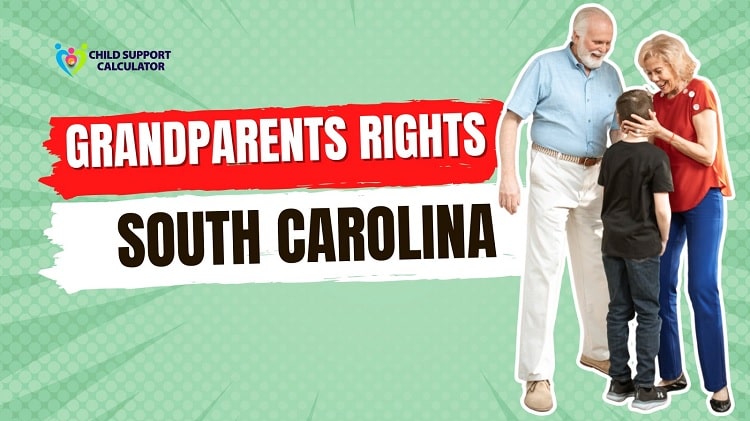Grandparents Rights In Wyoming (Updated) 2024
Grandparents can have a significant impact on their grandchildren’s life. When parents divorce or split, they may wish to cut relations with their ex-parents. Spouses’ Grandchildren are frequently caught in the crossfire.

Grandparents can seek visiting rights, but only if they can demonstrate that it is in their grandchild’s best interests. Grandparent visitation privileges are recognized in almost every state. Some states’ visitation restrictions, on the other hand, are far more restricted than others. It’s critical to be aware of the legislation in your own state. Grandparents rights in Wyoming are discussed in this article.
Grandparent Visitation Laws In Wyoming
Grandparents rights in Wyoming are not governed by federal law. The United States Supreme Court case Troxel v. Granville, decided in 2000, is the closest thing to a federal statute. In Troxel, the Supreme Court considered Washington’s permissive grandparent visiting statute. Despite the fact that the statute was ultimately upheld, Troxel remanded the case to the lower court so that the statute might be applied correctly.
Troxel established the notion that parents’ visiting and custody rights always take precedence over grandparents’ rights. Grandparents’ rights are subordinate to parents’ fundamental constitutional right to nurture their children. Furthermore, the Troxel case established that a grandparent’s visitation rights should not conflict with the rights of a stable parent.
Grandparent Visitation Rights In Wyoming
In Wyoming, judges assume that parents will provide for their children’s needs and act in their best interests. Obviously, this isn’t the case in all cases. Parents’ and grandparents’ visitation rights, on the other hand, do not have to be at odds.
Grandparent visitation may be granted as a result of a parent’s lack of interest in a child’s life. Similarly, even if a youngster is well-cared for by his or her parents, grandparent visiting may be appropriate.
A grandparent must submit a petition with the court requesting visitation in order to obtain grandparent visitation rights. The term “grandparent” encompasses a grandparent or great-grandparent for the purposes of the Act. To determine whether visitation is appropriate, a judge will consider the following factors:
- Grandparent visitation is in the best interests of the child.
- Grandparent visitation has no significant impact on the parents’ rights.
However, this criterion has been applied liberally by Wyoming courts on a case-by-case basis. The child’s best interests will be determined by the facts of the case and the strength of the grandparent-grandchild relationship.
In one example, in Wyoming, a set of paternal grandparents were granted visitation. The grandparents had been caring for the grandson full-time for four years while the child’s father was in school. The grandparents were granted almost no contact with their kid after the father relocated with his child.
Because of their deep attachment, the court found that continued visitation with the grandparents was in the grandchild’s best interests. Despite the parents’ claims that the visits were inconvenient, the court determined that the parents were just irritated by their loss of control. According to the law, a parent’s rights must be injured, not just inconvenienced.
Can a Biological Grandparent Obtain Visitation with an Adopted Child
Unless the adoption is by a family member, it’s rare for a grandparent to get visitation with an adopted grandchild, as in the situation stated above. A maternal grandmother requested visitation after her grandchild was adopted by an unrelated couple in another Wyoming case.
The child’s mother (the grandmother’s biological daughter) agreed to the adoption and gave up her parental rights. The grandmother’s request was denied by the court since adoption ends the parent-child relationship, and so eliminates the grandmother’s ability to seek visitation.
Grandparents can provide stability and security in their grandkids’ lives in some instances. Parents who are divorcing or separating often desire to eliminate links with the family of a previous partner. Many grandparents feel compelled to act in order to keep their grandchildren from losing their visitation rights.
A grandparent’s rights are usually regarded as secondary to those of a parent. Grandparents who have built a deep bond with their grandkids and want to remain active in their lives have legal remedies.
Grandparent Custody Rights In Wyoming
In some situations, a third person, such as a foster parent or grandparent, might seek custody of a child without the parents’ approval. The Constitution protects parental rights, and only clear and persuasive evidence can reverse them. To assess whether a change of custody for the kid is appropriate, a judge can consider the following criteria, which include but are not limited to:
- The child was purposefully abandoned or deserted by the parent.
- For at least one year, the parent willfully failed to contribute to the child’s maintenance.
- The parent has agreed to let the child stay in state custody for at least a year.
- The parent has been judged responsible for the child’s cruelty, abuse, neglect, or mistreatment.
In the end, a judge will decide on the best custody arrangement for the child. Foster parents and a maternal grandfather both sought custody of a child in one Wyoming instance. At the age of two, the child’s mother voluntarily placed the child in state custody.
The child was placed in foster care right away. The child’s grandfather wanted custody of his granddaughter at the same time, and the mother protested. As a result of the mother’s lack of involvement in her child’s life, nearly all of the aforementioned criteria were met.
The final decision on whether or not to approve or refuse an adoption rests with a Wyoming court. In this case, the foster parents were given custody, but the grandfather’s requests for custody and visitation were both denied.
The court’s ruling was based on the fact that the child had been in the foster parents’ care for nearly three years, that the foster parents and the child had a deep attachment, and that the grandfather was the biological father of the child’s mother. Grandparents rights in Wyoming were not granted in this case because the court determined that it was not in the kid’s best interests.
Faqs
In summary, grandparents in any of the 50 states do not have a legal right to see their grandchildren. The law is designed to safeguard parental rights above all else, and granting grandparents visitation privileges automatically is considered as a breach of a parent’s ability to choose what is best for their child.
In Wyoming Statute 20-7-101, the legislature established the rights surrounding grandparent visiting. According to the law, a grandparent may petition the court for reasonable visitation with their minor grandchildren.
A grandparent must submit a petition with the court requesting visitation in order to obtain grandparent visitation rights. The term “grandparent” encompasses a grandparent or great-grandparent for the purposes of the Act.
In summary, grandparents in any of the 50 states do not have a legal right to see their grandchildren. The law is designed to safeguard parental rights above all else, and granting grandparents visitation privileges automatically is considered as a breach of a parent’s ability to choose what is best for their child.
Grandparents, in reality, don’t have a legal leg to stand on. If your ex-daughter-in-law wishes to keep you from seeing your grandkids, she has every legal right to do so. You can approach her directly and negotiate access, or you can go through Mediation, but there’s no guarantee it will succeed.
Assuming the grandchild is over the age of 21, they are considered to have ‘aged out,’ and the parent must then file a separate petition for their child if they are qualified. Your grandma is unable to file a separate petition for you or your sister in your situation.







